Introduction
This newsletter provides a snapshot of the performance and outlook of the Greek hotel industry, within the broader context of the international hospitality industry as well as of Greek tourism and Greek socio-economic developments.
Current status of the Greek tourism sector
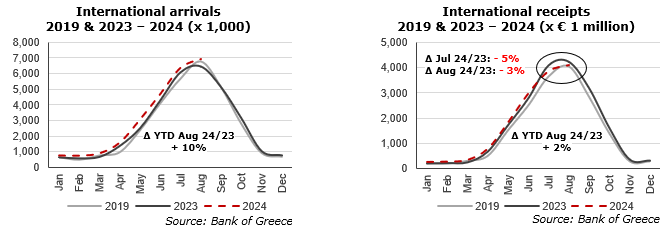
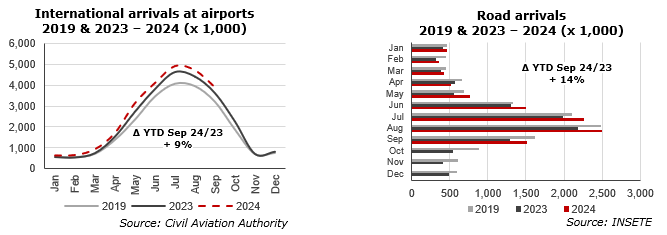
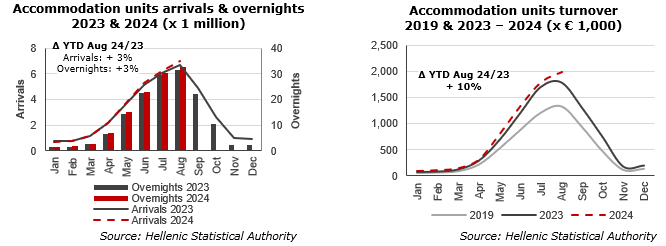

Hotel sector performance
- The latest performance indicators show that the Greek tourism sector is on track for another record year. YTD August 2024/23 data from the Bank of Greece indicates a 10% increase in international arrivals and a 2% rise in international travel receipts. The Hellenic Statistical Authority reports a 3% increase in both arrivals and overnights at accommodation units, alongside a 10% boost in accommodation revenue.
GBR Consulting's monthly hotel performance benchmark survey, which covers € 1.6 billion in net annual revenue, shows a 10.8% increase in revenue YTD September 2024/23. Resort hotels recorded an 11.0% rise in total revenue, while Athens and Thessaloniki saw a 10.0% increase in room revenue. Other city hotels in Greece experienced a 2.8% growth in room revenue for the same period.
According to the Civil Aviation Authority, international arrivals at Greek airports rose by 9% YTD September 2024/23. INSETE reported a 14% increase in road arrivals during the same timeframe.
- Noteworthy is the decline in international receipts in July and August 2024, which fell by 5% and 3% respectively compared to the same months last year. While not all data is available yet, tourists may have chosen for shorter stays to stay within budget resulting in lower receipts. Higher transportation and accommodation costs may have influenced spending on other aspects of the holiday experience. Additionally, there may have been a shift in the profile of travelers who did visit Greece, while others might have chosen to travel outside the peak summer period or selected different destinations due to budget constraints and heat considerations. Finally, it is noted that the composition of road travelers remains unclear, and Bank of Greece arrival data also includes day visitors.
Challenges for the Greek tourism sector to increase competitiveness and ensure sustainable growth
- It is encouraging to see that the focus has shifted from achieving record tourist arrivals and revenue to discussions about the future of Greece’s tourism sector. The industry faces multiple challenges that must be addressed to enhance competitiveness and ensure long-term sustainable growth. In the 2024 World Economic Forum’s Travel & Tourism Development Index (TTDI), Greece ranks 21st out of 119 countries, an improvement of five places since 2019. However, other European countries hold stronger positions: Spain maintains 2nd place as in 2019, France has moved up two spots to 4th, Italy is now 9th (up three places), and Portugal is 12th (up one place). Turkey, meanwhile, has advanced eight places to rank 29th.
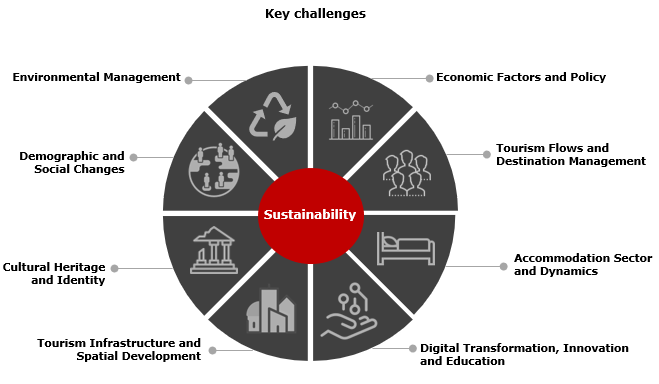
- Environmental Management
The public and private sectors must address climate change impacts and promote sustainable tourism practices to protect the environment. In December 2023, the Bank of Greece estimated the annual cost of climate change at € 2.2 billion, including the effects of wildfires, crop loss, and tourism decline. The report warned that without action, up to 40% of Greece, especially in the eastern and southern regions, could face desertification due to rising temperatures, more heatwave days, and reduced rainfall. Additionally, extreme rainfall events and wildfires are expected to become more frequent, significantly impacting agriculture.
- Demographic and Social Changes
With birth rates much lower than mortality rates, Greece faces an aging, declining population and a shrinking workforce. Addressing this requires a comprehensive strategy involving education, increased fertility rates, higher female workforce participation, retention of older workers, prevention of Brain Drain and promotion of Brain Gain, leveraging technology and AI, and immigration to support staffing needs. These workers also need adequate accommodation, and GBR Consulting recently completed a study with specific proposals on this matter.
Tourism must also respond to evolving traveller profiles, while embracing diversity, equity, and inclusivity to ensure that all visitors feel welcome. Additionally, the growth of digital nomads, local area nomads - who explore and work within different regions - and retirees present an opportunity for Greece to attract both international and domestic long-term visitors, boosting local economies.
- Cultural Heritage and Identity
Preserving Greece’s cultural heritage and identity is essential. This involves protecting historic sites, maintaining authenticity and a strong local identity. Regenerative tourism emphasizes positive contributions to residents' quality of life while safeguarding unique cultural characteristics for future generations.
- Infrastructure and Spatial Development
Upgrading transportation infrastructure - airports, seaports, marinas, roads, and public transport - will improve accessibility, while expanding digital infrastructure is equally important. Improvements to public utilities such as water, sewage, electricity, and health services are crucial to better serve local communities, accommodate rising visitor numbers, and prepare for climate change.
In July 2024, the Greek Government initiated a public consultation on the new Special Spatial Framework for Tourism, aimed at guiding sustainable tourism development and addressing planning issues. The consultation ended on September 25, 2025. The framework classifies areas into five categories based on the distribution of tourist accommodations: A (Control Areas/overdeveloped), B (Developed Areas),
C (Developing Areas), D (Areas with development potential), and E (Undeveloped areas). It also introduces the concept of “sporadic hotels” to create complex tourist accommodations in abandoned pre-1923 settlements or areas with fewer than 2,000 residents, aiming to revitalize these areas. Key tourism bodies have provided feedback for enhancements.
Simultaneously, Local Urban Plans are under development to regulate off-plan construction and address the issue of plots that do not face recognized roads.
- Economic Factors and Policy
Effective policies and regulations are essential for the economic sustainability of tourism. Stakeholders emphasize the need to streamline licensing procedures and reduce bureaucracy to encourage investment and remove uncertainties related to building regulations. The building bonuses under the New Building Code (NOC) launched in 2012 remain a topic of debate.
In September 2024, the government announced a significant increases in the climate resilience fee for accommodation guest, while a new levy will be introduced for cruise passengers effective January 1, 2025:
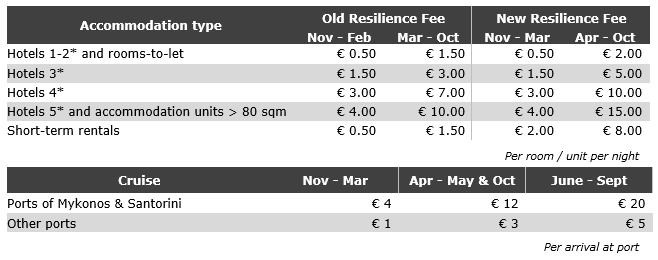
Stakeholders have criticized these measures, and there are concerns about whether the collected funds will be used for environmental protection or diverted to the state budget. The German Travel Association has also expressed worries about the potential impact on the price-sensitive German travelers.
With respect to hotel regulations, we note that the current legal framework dating from 2015 with a few amendments in later years is outdated preventing innovative concepts from entering the market. Pod hotels are not allowed for instance, and hostels are limited by a Youth Hostel law that restricts guests to those under 26. Concepts, such as long-stay student accommodation combined with short-stay hostels, cannot be legally implemented and there is no framework for staff accommodation. The Ministry of Tourism recently proposed creating staff units based on 2-star hotel specifications, but communal kitchens are not allowed within the legal framework of hotels. Therefore, it remains unclear under which framework a license can be issued for a hotel that will be used as staff accommodation.
- Tourism Flows and Destination Management
Addressing overcrowding at popular sites requires strategic measures such as timed entry systems - successfully implemented this year at the Acropolis in Athens – promoting off-season travel, and encouraging trips to less-visited areas. Regulatory actions like limiting short-term rentals, infrastructure upgrades, but also the use of technology and data and education and awareness programs, can further support these efforts. Establishing local Destination Management Organisations (DMOs) is crucial for coordinating and engaging local stakeholders, planning sustainable growth, and enhancing visitor experiences while protecting local communities. Effective local authorities play a pivotal role in implementing these measures, and boosting their operational capabilities and skills is essential for effective tourism management.
In the cruise sector, raising fees alone may not solve overcrowding issues from simultaneous disembarkations. Implementing a slot system to regulate the number of cruise ships at ports is essential to reduce congestion and provide an enjoyable experience for visitors.
- Accommodation Sector and Dynamics
Adapting to changes in accommodation preferences and embracing new hospitality trends is important for competitiveness. While short-term rentals can positively impact certain destinations, the market needs regulation. Uncontrolled growth has led to more short-term rental beds than hotel beds. In September, the government announced a one-year ban on new short-term rental agreements in three central Athens districts and plans to introduce operational requirements.
At a recent real estate conference in Athens, government officials mentioned that revenue from short-term rentals has grown tenfold since 2017, expected to reach € 830 million by the end of this year. Around 6,200 legal entities own more than three properties, 90% of which have active tax records. Approximately 100,000 income-generating properties have unique Property Registration Numbers, with 40,000 added in the last four years. About 25% of properties are rented for at least 90 days annually. Of the 80,000 properties owned by individuals, 80% are rented for less than 90 days, while 20,000 units are owned by legal entities, with at least half rented for more than 90 days. The average income per Registration Number is € 7,350 annually. Compared to the above, INSETE reports about 200,000 properties in the short-term market.
- Digital Transformation, Innovation and Education
Smart tourism technologies, such as data analytics, IoT, and AI, improve visitor experiences, optimize resource management, and enable real-time visitor management. Collaborative innovation involving government, academia, SMEs, start-ups, and investors drives new solutions that improve service delivery and adapt to shifting traveller expectations.
Modernizing tourism education in Greece is equally important to align with industry needs. Strengthening curricula, building partnerships with industry stakeholders, and emphasizing practical training are vital for equipping graduates and professionals with the necessary skills. The demand for top executives remains high.
Main hotel transactions
- This summer, Blackstone and Hotel Investment Partners (HIP) announced the acquisition of the 5-star Grand Hyatt Athens from Hines and Henderson Park for € 230 million. The 548-room hotel, formerly known as the Athens Ledra, was purchased by Hines and Henderson Park in 2017 for € 33 million through an auction and subsequently underwent significant renovation and expansion. Founded in 2015 and acquired by Blackstone-managed funds in 2017, HIP holds a portfolio of 72 hotels across Spain, Greece, Italy, and Portugal.
- In September 2024, Israel Canada Hotels, 68% owned by the real estate company Israel Canada, announced the signing of two non-binding memoranda of understanding (MOUs) for the acquisition of Brown Hotels in Israel and Greece. The first MOU covers the lease contracts for 8 Brown Hotels in Greece with a total capacity of 1,067 rooms, while the second concerns the acquisition of the Brown Hotels' operations in Israel. The combined value of both transactions is estimated at $ 26.5 million. Israel Canada Hotels currently owns 15 hotels: 12 in Israel and 3 in Greece (PLAY Theatrou Hotel and PLAY Psyri Hotel in Athens, and PLAY Paros Hotel in Paros).
|